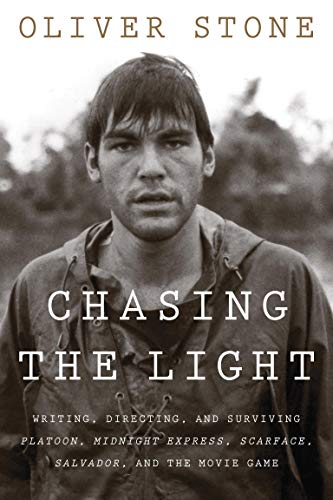 By OLIVER STONE (Houghton Mifflin Harcourt; 2020)
By OLIVER STONE (Houghton Mifflin Harcourt; 2020)
Oliver Stone is a filmmaker who tends to elicit a great many opinions, most of them negative. Speaking as one who quite literally grew up watching his films, I couldn’t help but gravitate toward this, Mr. Stone’s long-in-coming memoir. Stone may have lost his head a bit in recent years (in his shameless public fawning over Vladimir Putin, among other things) but his storytelling instincts remain quite sharp, and this book may not contain much information that can’t also be found in James Riordan’s 1995 biography STONE (from which CHASING THE LIGHT quotes quite extensively) but it’s worth experiencing Oliver Stone’s life story from the man’s own highly individual perspective.
Stone may have lost his head a bit in recent years (in his shameless public fawning over Vladimir Putin, among other things) but his storytelling instincts remain quite sharp…
The biggest drawback of CHASING THE LIGHT is that it only covers a portion of its subject’s life, specifically the years from Stone’s birth to the release of PLATOON. We also get only a small taste of Stone’s legendary off-screen outrages (the book’s biggest laugh occurs when Stone takes the late Michael Cimino to task for his love of excess, which brings to mind a cliché involving a pot, a kettle and a certain color).
But again, Stone’s knack for spinning a yarn is displayed throughout CHASING THE LIGHT. That he’s a skilled screenwriter is evident in his descriptions of his early years in New York, accomplished without a lot of extraneous childhood memories (which are invariably quite interesting to the author but plain boring to the reader). Rather, the focus is kept where it should be: on the relationship between his stockbroker father and sophisticated French immigrant mother, whose divorce when Stone was a teenager was a galvanizing event, sending him on a vision quest of sorts that included quitting college in 1965 to teach English in Saigon, and returning in the US Infantry two years later to “take part in this war of my generation.”
Stone’s knack for spinning a yarn is displayed throughout CHASING THE LIGHT.
Stone’s wartime experiences (which I’d have expected to be overwrought) are likewise delineated with admirable economy. They left him a freaked-out dope fiend who, upon returning to the US after nearly a year in the bush, was promptly thrown in jail. After writing a screenplay called BREAK and briefly dabbling in acting he enrolled in NYU, where he was taught by Martin Scorsese—who after viewing Stone’s student project LAST YEAR IN VIETNAM told the class “this is a filmmaker.”
From there Stone worked as a cabdriver while writing scripts, including an early draft of PLATOON. Of his directorial debut, the 1974 horror no-budgeter SEIZURE, Stone isn’t too forthcoming, with far more attention lavished on 1978’s MIDNIGHT EXPRESS, which Stone scripted. He has little good to say about its director Alan Parker, who according to Stone was bitter and unpleasant. The film, though, won Stone an Oscar, leading to a host of lucrative screenwriting offers and the Stone-scripted films CONAN THE BARBARIAN from director John Milius (“a likeable egomaniac”), SCARFACE from Brian de Palma (“a cold man”) and YEAR OF DRAGON from Michael Cimino (a “control freak”). Stone also directed another unsuccessful horror film (1981’s THE HAND), and wrote the script for 8 MILLION WAYS TO DIE, which would be made into a very bad 1986 film.
The highlight of Stone’s early career, and this book, came with SALVADOR in 1985. Its calamitous shoot is detailed quite extensively, with perilous south-of-the-border shooting conditions, a temperamental star (James Woods) and a painfully low budget all taking their toll. The 1986 filming of Stone’s dream project PLATOON in the Philippines was nearly as fraught, but at least the finished film was rapturously received, and well represented at the Oscars.
The book’s final pages are taken up with Stone being feted at the 1987 Academy Awards ceremony. It ends on a rather ominous note, with Stone noting that “Thirty years now, I look back and realize I had no idea then of the storm that was coming.” Let’s hope Oliver Stone has a follow-up volume in the works, as I’d very much like to get his take on that storm.
